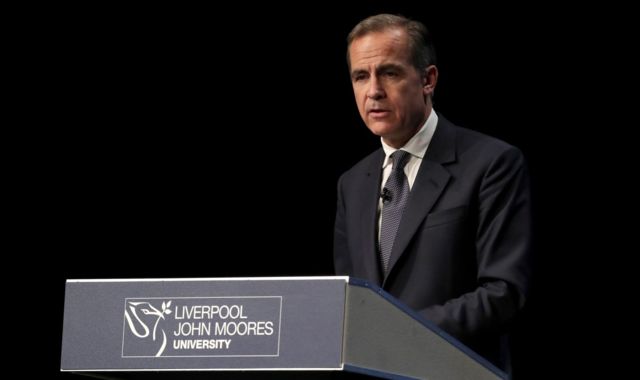"We must tackle isolation and detachment caused by globalisation"- Mark Carney
Speaking against a backdrop of growing support for anti-establishment politicians, Carney repeatedly referred to people’s isolation, sense of insecurity and their frustrations with global trade and technology. Those forces had favoured the “superstar and the lucky”, he said. “But what of the frustrated and frightened?”
“From the rising spectre of global terrorism to intensifying geopolitical tensions and financial crises, for too long, for too many people, the world seems to be getting riskier,” he said in a lecture to Liverpool John Moores University.

Photo: reuters.com
Thank you Governor Carney for your honesty and truthfulness: I am not surprised. Canadians are known to be polite and honest.
In your speech in Liverpool on Monday, you said: “We meet today during the first lost decade since the 1860s. Over the past decade real earnings have grown at the slowest rate since the mid-19th century.”
This lack of growth had caused inequalities, and has led people to question their futures and the benefits of globalisation.
Many people across the advanced world were “losing trust” in a system that did not “raise all boats”, you said.
Far from enjoying a “golden era”, globalisation for these people had become “associated with low wages, insecure employment, stateless corporations and striking inequalities”.
You warned: “Turning our backs on open markets would be a tragedy, but it is a possibility.”
The success of populist, anti-establishment movements, such as Brexit, the rise of the French Front National and the recent Italian referendum, has been linked to dissatisfaction with globalisation across Europe. Middle-class incomes in Western economies have suffered with the growth of Chinese and emerging-market manufacturing and widespread automation.
You also noted that putting “individuals back in control” by equipping workers with the skills needed to adapt to technological change were vital.
You also said “the tide must be turned back on stateless corporations” in order to maintain a sense of fairness. “Companies must be rooted and pay tax somewhere,” he said.
You then listed three priorities:
- “Economists must clearly acknowledge the challenges we face including the realities of uneven gains from trade and technology"
- "We must grow our economy by rebalancing the mix of monetary policy, fiscal policy and structural reforms"
- "We need to move towards more inclusive growth where everyone has a stake in globalisation."
Dear Governor Carney,
Thank you for what you said last night at Liverpool John Moores University: Very well said.
I do not wish to repeat myself again, but only to recall the words and sentiments of an Open Letter I had written to you on 12 June 2015, following on your fine speech at the Mansion House on 10th of June.
In that letter, and again now, I wish to share with you that, in order to achieve the goals you have set for us, then and now, we need to have:
3- A different educational values and models
4- We must ensure that there is, once again, a sense of trust and fairness in all we do.
5- And we must aim for an economy that is for the greater good, promoting social justice for all.
There in much more I can say and add to what I have noted above. But, I had said all these before in my Open Letter to you last year.
Therefore, I most humbly, offer the said Letter again for your kind attention and perusal:
Open Letter to Mark Carney, Governor of the Bank of England
I very much believe that if we take the above steps, and adhere to the points I have raised in my Letter, then, we have prepared the fertile soil to plant the seeds of what I believe is what people are asking for: Globalisation for the Common Good.
GCGI: Introduction and a bird’s eye view

‘We recognise that our socio-economic problems are a reflection of our attitude to life and to one another. Justice, peace and harmony will come about only when the connection between the spiritual and practical in life is valued by each one of us and in society at large. This is beautifully expressed in a Chinese proverb:
“If there be righteousness in the heart, there will be beauty in the character.
If there be beauty in the character, there will be harmony in the home.
If there be harmony in the home, there will be order in the nation.
When there is order in each nation, there will be peace in the world.”
This brings the problems of life closer to home. It is not ‘they’ who have to change, but ’we’ who have to change our attitude. It is a journey from ‘what’s in it for me’ towards discovering, living and promoting the common good. The principle of the common good reminds us that we are all responsible for each other – we are our brothers' and sisters' keepers – and must work for social conditions which ensure that every person and every group in society is able to meet their needs and realise their potential. It follows that every group in society must take into account the rights and aspirations of other groups, and the well-being of the whole human family.
One of the greatest challenges of our time is to apply the ideas of the global common good to practical problems and forge common solutions. Translating the teachings of philosophers, spiritual leaders and religious scholars into practical policies that statesmen can apply across the world is a challenge which Globalisation for the Common Good Initiative (GCGI) has taken on. The purpose is not simply to talk about the common good, or simply to have a dialogue, but the purpose is to take action, to work for the common good, using dialogue to resolve differences.
What the GCGI seeks to offer - through its research and conferences, as well as its outreach and dialogue projects - is a vision that places the quest for economic and social justice, peace and ecological sustainability within a spiritual context and a practice of open-heartedness, generosity and caring for others. All are thus encouraged by this vision to serve the common good.
The GCGI has from the very beginning invited us to move beyond the struggle and confusion of a life preoccupied with materialism to a meaningful and purposeful life of hope and joy, gratitude, compassion, and service for the good of all.
Perhaps our greatest accomplishment has been our ability to bring Globalisation for the Common Good into the common vocabulary and awareness of a greater population along with initiating the necessary discussion as to its meaning and potential in our personal and collective lives.
In short, at Globalisation for the Common Good Initiative we are grateful to be contributing to that vision of a better world, given the goals and objectives that we have been championing since 2002.’
Thank you.
